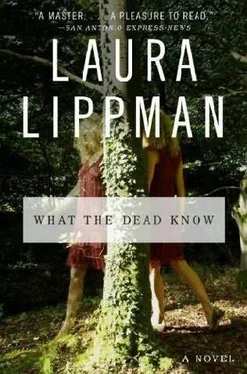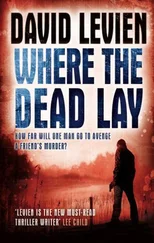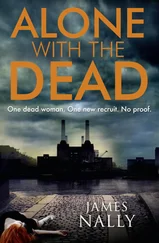“Who?” Kay asked, and the other two women regarded her as if she were genuinely freakish.
Gloria perched on a corner of Heather’s bed. “The more pressing problem is that the police continue to insist that you’re required to provide the name and address under which your driver’s license was issued. Without those, you can be jailed in connection with the accident. So far, I’ve managed to persuade them that your potential as a material witness trumps your role as a defendant in a highway collision that was really no one’s fault. But they’re getting restless. We need to throw them a few facts to satiate them. How long has it been since you were Heather, Heather?”
She closed her eyes. Her skin was so fair and the lids so thin that it appeared as if she were wearing blue-pink eye shadow, lightly applied.
“Heather disappeared thirty years ago. The last time I changed names-it’s been sixteen years. My longest stretch yet. I’ve been this me longer than I’ve been any other me.”
“Penelope Jackson?” Kay asked, knowing of the name the patrol cop had used when Heather was admitted Tuesday night.
“No,” Heather said sharply, eyes flying open. “I am not Penelope Jackson. I don’t even know Penelope Jackson.”
“Then how-”
Gloria held up a hand to stave off Kay’s questions, and it was impossible not to notice how ragged her manicure was, how dull her diamond rings were. A piece of jewelry must be very dirty indeed if Kay’s eyes registered it as dull.
“Kay, I trust you, I do. And I need your help. But you have to respect boundaries. There are some things that must remain, for now, between Heather and me. If -always if, understand that I am speaking speculatively for now-Heather obtained her current identity illegally, then I’m going to argue she’s entitled to protect that information under the Fifth Amendment-no self-incrimination. She’s trying to protect her life and I’m trying to protect her rights.”
“Fine. But it’s harder to help if I don’t have sufficient information.”
Gloria smiled, not buying it. “I don’t need a second chair, Kay. I need someone who can guarantee housing for Heather while this is being straightened out. Housing and, perhaps, public assistance, short term.”
Kay did not bother to ask why Gloria couldn’t lend her client money or take her into her home. Such things would have been anathema to the attorney, who had already violated her own standards by taking a case without a big fat retainer up front.
“Gloria, you are so out of the loop. There hasn’t been financial assistance for single adults in Maryland since…shit, the early 1990s. And to qualify for anything, you need papers. Birth certificate, Social Security.”
“What about a victims’ assistance network? Isn’t there some advocacy group we could plug Heather into?”
“They specialize in emotional support, not financial.”
“This is what the police are counting on,” Gloria said. “Heather Bethany has no money, nowhere to go-except jail. In order to prevent that, she has to reveal where she’s been living, what she’s been doing. But Heather doesn’t want to do that.”
Heather shook her head. “At this point the life I’ve made for myself is all I have.”
“You have to see,” Kay said, “how impossible that will be.”
“Why?” A child’s question, asked in a child’s tone.
Gloria answered. “The Bethany case is the kind of thing that attracts a lot of attention.”
“But I’ve already told you that I don’t want to be that girl.”
Foolishly, Kay couldn’t help thinking of the old television show, Marlo Thomas with her enormous eyes and shiny bangs, a small-town girl breezing through the big city. Now there was a name she knew.
“You don’t want to be who you are?” Gloria asked.
“I don’t want to go back to the life I managed to make for myself and have everyone treat me like some freak, the girl of the moment-the runaway bride, the Central Park jogger, whoever. Look, it took a lot for me to get to a place of even seminormalcy. I was taken from my parents when I was a kid. I saw…things. I didn’t finish college, I drifted through a lot of jobs before I found one that suits me, allows me to have the kind of life that everyone takes for granted.”
“Heather, not to be crass, but there will be financial opportunities for you, if you choose to pursue them. Your story is a commodity.” Gloria’s smile was wry. “At least I assume it is. I’ve taken it on faith that you are who you say you are.”
“I am. Ask me anything about my family. Dave Bethany, son of Felicia Bethany, abandoned by her husband early in the marriage. She worked as a waitress at the old Pimlico Restaurant, and she preferred to be called ‘Bop-Bop’ instead of anything grandmotherly. She retired to Florida, to the Orlando area. We visited her every year, but we never went to Disney World because my father didn’t approve of it. My dad was born in 1934 and died, I think, in 1989. At least, that’s when his phone was cut off.” She rushed on, as if fearful of letting anyone else speak or ask questions. “Of course I kept tabs. My mother, Miriam, must have died, too, because there’s no trace of her. Maybe that has something to do with her being Canadian. At any rate, there’s no record of her, not anywhere I checked, so I assumed she was dead.”
“Your mother was Canadian?” Kay echoed back stupidly, even as Gloria said, “But your mother is alive, Heather. At least that’s what the detective thinks. She was living in Mexico five years ago, and they’re trying to track her now.”
“My mother’s…alive?” The collision of emotions in Heather’s face was strangely beautiful, like one of those thunder bursts in the middle of a sunny summer day, the kind that made old women nod and say: The devil must be beating his wife . Kay had never seen grief and joy in such extremes, trying to coexist in the same place. The joy she could understand. Here was Heather Bethany, thinking herself an orphan, with nothing to claim but a name and tabloid tale. Yet her mother was alive. She was not alone.
But there was anger, too, the skepticism of someone who trusted no one.
“Are you sure?” Heather demanded. “You say she was in Mexico five years ago, but are you sure she’s alive now?”
“The original detective seemed to think so, but it’s true, they haven’t found her yet.”
“And if they do find her…”
“They’ll probably bring her here.” Gloria made a point of capturing Heather’s eyes in hers, holding the look. It was a snake charmer’s gaze, if one could imagine a mildly exasperated snake charmer in a rumpled knit suit. “Once she’s here, Heather, they’ll want to do DNA tests. You understand, you get where this is going?”
“I’m not lying.” Her voice was dull and listless, as if to suggest that lying was simply too much effort. “When will she get here?”
“It all depends on when they find her and what they tell her when they do.” Gloria turned to Kay. “Can’t the hospital keep Heather until, say, her mother arrives? I’m sure she’ll be happy to put her up.”
“It’s impossible, Gloria. She has to leave today. The administration is very clear on that.”
“You’re playing into the police’s hands, giving them the leverage they want to rush this thing through, force Heather on to their timetable. If she’s discharged without a plan, they’re going to put her in jail-”
Heather moaned, an unearthly, inhuman sound.
“What about House of Ruth? Can’t she go there?”
“It’s a battered-women’s shelter, and you know as well as I do that it’s full up.”
“I was abused,” Heather said. “Doesn’t that count for something?”
Читать дальше












